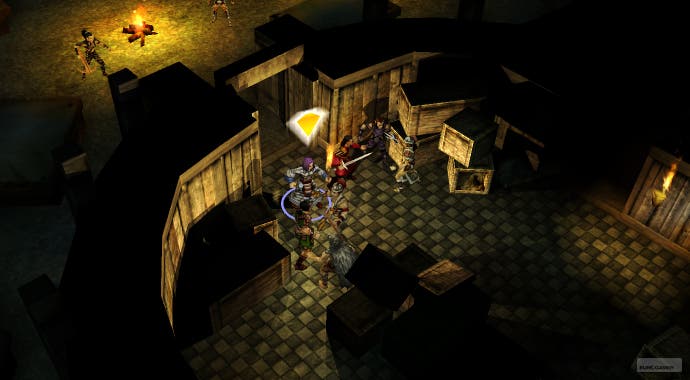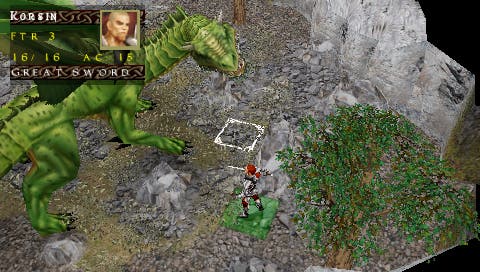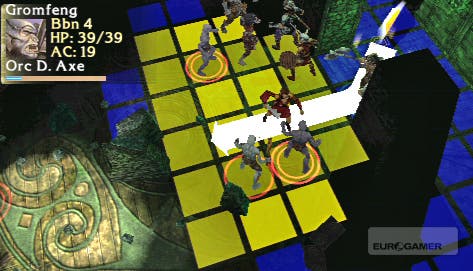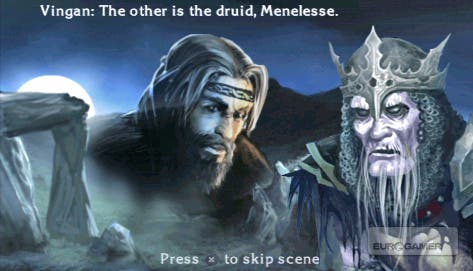Dungeons & Dragons Tactics
Throwing the rulebook at you.
Even among videogames fans - who are hardly in a position to poke fun - the mention of Dungeons and Dragons conjures up an image of, well, nerds. It's not exactly a fair image; okay, so there are plenty of socially awkward and hygenically challenged virginal males who get a bit too excited about pen and paper role-playing, but there are plenty of perfectly nice, friendly, interesting people who enjoy the pastime as well.
No, really.
At the end of the day, it's just a social pursuit like any other; drop in a bottle of whiskey alongside the 20-sided dice, and it's a fine recipe for an evening in. However, despite our compulsion to defend role-playing, we have to confess that there's something to the whole "nerd" allegation - something summed up almost perfectly by a quick glance at the most recent Dungeons and Dragons rule set.
All three books of it. Three books laden with statistics, rules and minutiae, complex, intererlocking sets of equations and regulations which define how the game is played down to its most minor details. It's tough, certainly, to flip through those three books and not come down heavily on the side of classing anyone who does this stuff for fun as a nerd.
Those three books are Dungeon and Dragons Tactics' greatest strength. Unfortunately, they're also one of its greatest weaknesses.
Made To Be Broken

What we have here, you see, is a really faithful attempt to replicate as much as possible of the Dungeons and Dragons 3.5 ruleset - the most recent set of rules for the game - in a PSP game. It transpires that "as much as possible" actually accounts for a pretty damn significant chunk of those rules.
The results is a game whose combat is incredibly complex, relying on a vast number of factors to work out even the most simple of interactions. Fans of the pen-and-paper game will nod sagely and feel vaguely satisfied about the whole affair as a result, even though certain advanced aspects - most notably, the ability to combine aspects of different classes into one character - have been omitted. Right from the vast array of options at character creation, where you initially build your party, it's clear that the game is juggling a vast array of stats and equations to work everything out.
Herein, though, lies our first problem with Dungeons and Dragons Tactics (DDT? Can we call it DDT?). The game is definitely juggling loads of stats to work out whether or not your characters are capable of hitting barn doors with banjos - but it doesn't actually tell you what it's doing. The end result is that you're left standing glumly, holding your banjo, surrounded by menacing barn doors, and with little clue as to what you're doing wrong.
Even to a relative Dungeons and Dragons novice (such as this humble reviewer), it's clear that a major part of the appeal of the game lies in actually understanding how things flow in combat. It's important to see the dice rolls that decide how things are going to turn out, so when you take damage or fail to land an attack, you know why.

DDT (we're going to call it DDT. Sorry.) robs you of that ability, turning combat - to a great extent - into a black box. You know complex stuff is happening, but the fact that it's a calculation based on complexity rather than sheer bloody malice doesn't help much when your party members are dead and you don't know why. Lacking the feedback and information flow that makes it palatable in pen and paper games, the beloved rule-set becomes unwieldy and, frankly, downright frustrating.
This is by no means improved by interface design which is shockingly awful in many places. DDT implements the idea that characters can be "encumbered" by carrying around too much stuff - but then fails to tell you how much anything weighs before you pick it up. Instead, you have to descend into the inventory management screens each and every time you pick up an item.
Given the focus on those screens, you'd think a lot of effort would have gone into the interface design here - but no, sadly not. The act of working out whether something you've acquired is better than something you have equipped is an exercise in pain as you slog back and forward through multiple screens. Managing your inventory is a nightmare of labyrinthine navigation, as you flip over and back through multiple menus to perform tasks that should be incredibly simple.

Party Animals
One of the game's more interesting features is that your alignment - good or bad, chaos or order, and so on - determines how you progress to a large extent, and is in itself decided by your own actions. No matter how squeaky clean you are in character creation, by the time you've kicked a few dogs and glued up the wheels of some children's stupid wheelie shoe things, you'll be well on the road to evil.
That's almost ironic, with hindsight, because the game itself suffers a similar fate. It sets out with a great idea - implementing a complex, gargantuan but incredibly finely balanced rule set in a dungeon crawling RPG (ignore the Tactics moniker - this is a pure turn-based RPG title, a distant relative at best of games like the excellent Final Fantasy Tactics). Along the way, though, it screws up really badly in its user interface, and these basic, fundamental flaws set it well on the path to being shockingly average, verging on poor.
It's a shame, because the presentation isn't bad. Some of the animations are a little dodgy at times, and we didn't like the camera's tendency to snap around the place and miss out key moments (like telling us whether certain attacks had actually hit, or if one of your characters has kicked the bucket) - but there's a good level of detail on characters and environments alike, and the game is genuinely pretty to look at in places. The storyline is pure Dungeons and Dragons, in that it's utterly generic fantasy pulp, but as filler to move you from dungeon to dungeon, it serves its purpose.

There's wireless multiplayer in here as well, but it's a fairly major disappointment. You can't take your characters from singleplayer into multiplayer environments, so you have to roll new ones; and there's no way to play the single-player game co-operatively. Instead, you're offered modes like deathmatch and co-op dungeon exploration, which rely on a very limited number of multiplayer maps.
Taking the tabletop Dungeons and Dragon rule-set and making it work on a handheld was always going to be a tough job, and while the team behind DDT has made a reasonable stab at it, the end result is a game that really doesn't make the grade. If you don't have a Dungeons and Dragons background, the game will seem impenetrable and dull - and even players of the tabletop game will appreciate the detail, but hate the incredibly clumsy interface and lack of information and feedback. It's a combination that makes DDT tough to recommend.

